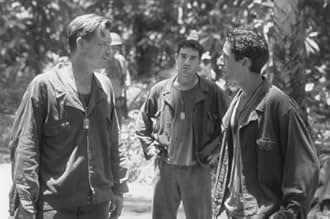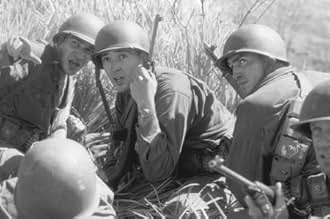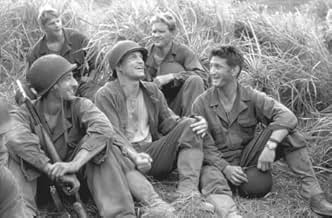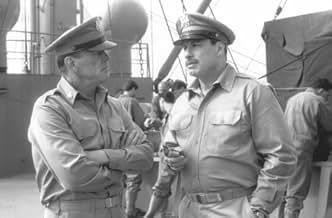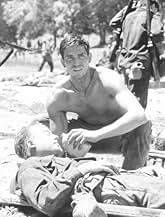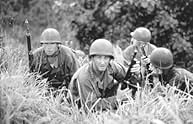द्वितीय विश्व युद्ध के दौरान ग्वाडलकैनाल में संघर्ष पर ध्यान केंद्रित करते हुए, जेम्स जोन्स के आत्मकथात्मक 1962 के उपन्यास का रूपांतरण.द्वितीय विश्व युद्ध के दौरान ग्वाडलकैनाल में संघर्ष पर ध्यान केंद्रित करते हुए, जेम्स जोन्स के आत्मकथात्मक 1962 के उपन्यास का रूपांतरण.द्वितीय विश्व युद्ध के दौरान ग्वाडलकैनाल में संघर्ष पर ध्यान केंद्रित करते हुए, जेम्स जोन्स के आत्मकथात्मक 1962 के उपन्यास का रूपांतरण.
- 7 ऑस्कर के लिए नामांकित
- 23 जीत और कुल 47 नामांकन
- Witt's Mother
- (as Penny Allen)
- Melanesian Villager
- (as Benjamin)
फ़ीचर्ड समीक्षाएं
The company is not made up of conscripts but regular soldiers. Some of them have been in the Army more than 10 years. Some of them however have never seen real action before and this is a hot and uncomfortable location, despite the lovely tropical scenery. Some crack up, some die, some do heroic deeds. Their leaders are not particularly admirable; one is quite happy to get his men killed if he can come out of the action looking good.
Out of sight for most of the film are the Melanesian inhabitants, the Solomon Islanders, who are carrying on living as best they can while the war rages around them. Their serenity is in sharp contrast to the frenetic military activity. Of course, there is nowhere for them to go.
There is some action excitingly filmed but as in real wars much of the time is spent preparing and waiting. Personal stories unfold but at the end it is survival that matters.
The lighting and photography is quite superb, the lighting in particular fitting the mood perfectly. Filming was not actually on Guadalcanal but near Port Douglas in Northern Queensland where there is similar tropical rainforest and fauna but with much easier logistics. It took ages apparently but seems more than worth the effort.
This is probably one of the four or five greatest war films ever made, right up there with "All Quiet on the Western Front, " "Paths of Glory," "Bridge on the River Kwai" and "The Longest Day." Never has a movie better portrayed what it's like to be a frontline soldier.
Terrence Malick has the reputation of being an eccentric, difficult director - Kubrick without the fear of flying. Yet this is not a particularly unconventional movie - it's just that everything hangs together - the story, dialogue, performances, photography and settings. On thing is clear - this is a better interpretation of James Jones' novel than the 1964 version.
The Thin Red Line asks a lot of good questions about death, war, and the ultimate meaning of life. Now that I have seen it, I'm very surprised that this film did not win picture of the year. Spielberg's film was a gritty, realistic portrayal of war. But it was also highly commercial and had a very contrived plot. In comparison, this film sort of wanders through itself and in the process helps to put you in the boots of the soldiers it portrays.
My only criticism is perhaps the film was a bit long, but I never noticed that the second time through. I can't praise this film enough. Excellent work.
Malick came in with this pack, concerned with newly emerging ideas about meaning and language. The philosophy establishment was forming a new split (US and Continentals) largely characterized by how to reinvent Wittgenstein's insights but with a more friendly rationale. Chomsky was shaking one world, formal abstraction for computers another. Exciting --- moreso than today. But Malick was not a verbal communicator, nor a logician, nor an academic (all sides of the same thing). So he dove into practical visual semiotics.
He is not a brilliant man, merely a journalist. But he does seem to be particularly honest and understands some damned good, solid, human ideas compared to other filmmakers. One can really see this early MIT exposure in 'Red Line.'
We can thankfully forget plot -- there is not meant to be any story. In fact, the war is only used here as a canvas of motion, abstractions of 'regular' life, colliding and sometimes adhering to souls, sometimes destroying them. The device is to build the film around the sounds: narrative voiceovers (current and remembered), natural sounds, haunting music. The images are attached to the sounds, which are derived from abstractions. This is exactly the reverse of Spielberg, which is why there cannot be any comparison to 'Private Ryan,' or any other film that is 'about' something. It is why Malick can never 'explain' his films.
The execution is hypnotic. I wonder what the six-hour version is like. The editing (and particularly of the sound) is unusual, so transports us beyond the strangeness of tropics, war, history. That editing is much like Van Morrison's music: it establishes the rhythm only as a reference to dance around, peeking in and out. The relationship of the rhythm within the shots to the rhythm of the shots is very bluesy.
Having no story opens new possibilities and creates unfamiliar problems. An opportunity is that the film can have many centers: the meditator in the midst of the attack on the camp; the squabble of the villagers; the transport of the ship; the need to look at our own dogtags. The challenge is how to end. When you stick to a formula like Spielberg, you just turn the crank and the climax lifts and comes down, and the story finishes. No story, no formula, so Malick brackets with the transport to and from the island, by the aging of the southern rookie, and by the exit from and re-entry to a world of unfamiliar characters. That they are played by familiar actors (Travolta, Clooney) oddly emphasizes the point.
It must have been educational to work on this film, which is why every intelligent actor (or an actor with an intelligent agent) wanted to participate: one can see direct influence in Penn's 'The Pledge' and Cusack's 'High Fidelity,' both highly abstract.
Penn knew exactly what he was doing here. He moves in the action, as an actor must. But he places his character offscreen in the abstract voiceovers. That's the 'real' Welsh, and the film's image only an abstraction. He truly understands presenting many dimensions simultaneously. Harrelson doesn't, but that's the point with Keck. I wonder why Depp didn't make the cut?
Terrence Malick's films are not everyone's cup of tea, and this is not only not the exception, but probably the most extreme example of that at display: There are many qualities from this movie that are frankly admirable (Particularly its brilliant cinematography and performances) but it is also the kind of movie that is quite tedious to watch at moments.
And it's already a pretty long film, it feels even longer than it actually is.
If you are about to watch this, don't expect something like "Saving Private Ryan". Expect something more akin to Apocalypse Now Redux: A brilliant, but also tedious movie that is both beautiful and both tiring at moments.
क्या आपको पता है
- ट्रिवियाMost of Adrien Brody's scenes were cut from the film and he wasn't aware of these changes until he saw the film at the premiere. Brody came to the premiere expecting to see himself as the lead character and was shocked when he saw that he was barely featured in the film, especially since Cpl. Fife was the central character in the novel on which the movie was based.
- गूफ़In one of the flashback scenes where the soldier and his girlfriend are holding hands, modern cars can be seen out the window in the background.
- भाव
Private Edward P. Train: [narration] This great evil, where's it come from? How'd it steal into the world? What seed, what root did it grow from? Who's doing this? Who's killing us, robbing us of life and light, mocking us with the sight of what we might've known? Does our ruin benefit the earth, does it help the grass to grow, the sun to shine? Is this darkness in you, too? Have you passed through this night?
- क्रेज़ी क्रेडिटComposer Wrangler. . . Moanike'ala Nakamoto
- कनेक्शनFeatured in HBO First Look: The Thin Red Line (1998)
- साउंडट्रैकThe Unanswered Question
Composed by Charles Ives
Performed by Orchestra of St. Luke's (as The Orchestra of St. Luke's)
Conducted by John Adams
टॉप पसंद
- How long is The Thin Red Line?Alexa द्वारा संचालित
विवरण
- रिलीज़ की तारीख़
- कंट्री ऑफ़ ओरिजिन
- भाषाएं
- इस रूप में भी जाना जाता है
- La delgada línea roja
- फ़िल्माने की जगहें
- उत्पादन कंपनियां
- IMDbPro पर और कंपनी क्रेडिट देखें
बॉक्स ऑफ़िस
- बजट
- $5,20,00,000(अनुमानित)
- US और कनाडा में सकल
- $3,64,00,491
- US और कनाडा में पहले सप्ताह में कुल कमाई
- $2,82,534
- 27 दिस॰ 1998
- दुनिया भर में सकल
- $9,81,26,565
- चलने की अवधि2 घंटे 50 मिनट
- रंग
- ध्वनि मिश्रण
- पक्ष अनुपात
- 2.35 : 1
इस पेज में योगदान दें






